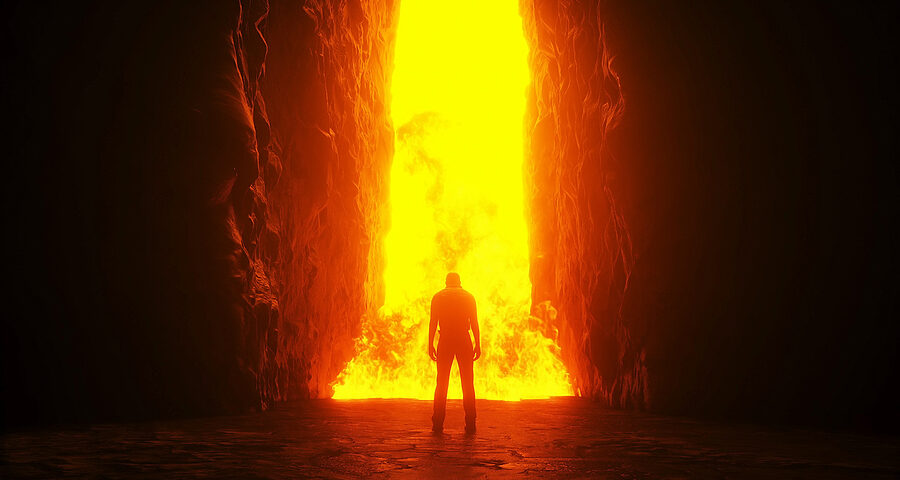
How many will be saved?
The question, “How many will be saved?” isn’t answered. Except through the admonition we’ve heard numerous times from Our Lord, “Strive to enter through the narrow gate.”
His implication clear. Many rush through the wide and inviting gate to where, exactly?
Here is the complete reading.
Jesus passed through towns and villages,
teaching as he went and making his way to Jerusalem.
Someone asked him,
“Lord, will only a few people be saved?”
He answered them,
“Strive to enter through the narrow gate,
for many, I tell you, will attempt to enter
but will not be strong enough.
After the master of the house has arisen and locked the door,
then will you stand outside knocking and saying,
‘Lord, open the door for us.’
He will say to you in reply, ‘I do not know where you are from.
And you will say,
‘We ate and drank in your company and you taught in our streets.’
Then he will say to you,
‘I do not know where you are from.
Depart from me, all you evildoers!’
And there will be wailing and grinding of teeth
when you see Abraham, Isaac, and Jacob
and all the prophets in the kingdom of God
and you yourselves cast out.
And people will come from the east and the west
and from the north and the south
and will recline at table in the kingdom of God.
For behold, some are last who will be first,
and some are first who will be last.”
It’s an unnerving reading and sets itself up, in my mind, to describe me.
Outside the locked door, hearing, “I don’t know where you are from.” How many will be saved?
The years before my conversion weigh heavily. At times, oppressively so. Either my first or second spiritual director told me that we’re “redeemed sinners.” Apropos of our conversation following confession that morning, Fr. Roland continued,
“In my experience, cradle Catholics focus on the redeemed part of that ratio and converts on the sinner.”
Even after a couple of decades as a Catholic Christian, his observation about this convert still fits. One of the zillions of reasons I love praying the psalms of the Divine Office:
Guide me by your fidelity and teach me,
for you are God my savior,
for you I wait all the day long.
Remember your compassion and your mercy, O LORD,
for they are ages old.
Remember no more the sins of my youth;
remember me according to your mercy,
because of your goodness, LORD.
But Bishop Barron speaks of a specific message in this Gospel passage. He reminds us of our need to place the unnamed man questioning Jesus in the context and culture of ancient Israel. The man, according to Bishop Barron wasn’t asking a question. No, he was a Jew: one of the Lord’s Chosen People: the People of The Law.
God was theirs. And only theirs.
This is an intriguing homily,
For a number of reasons. Foremost among them are Bishop Barron’s clarity in his discussion of hell, the fact of its existence and the Catholic Church’s position on eternal condemnation. Including Hitler, Mao, Stalin.
- Does hell exist? “Well yeah, I’ve been there, most people I know have been there, the suffering that comes from resisting God’s love.”
- Is there a better definition of hell than that? “The suffering that comes from resisting God’s love. It begins here.”
- What about the eschatological hell? How many are there?
- “I don’t know,” he answers,” the church has a canonization process for those saints known to be in Heaven. There’s no corrollary for those in hell.
- To the oft-asked question of what about Hitler, Stalin and Mao, he asks, “Does any of us have a god-like view of what’s going on in the depths of their minds, conscience and hearts? Does any of us know if there was contrition, regret and/or sorrow at the time of their death?”
- And so Bishop Barron states, ” I’ve staked out the position that we may hope everyone will be saved…and quotes the catechism, “in hope, the Church prays for the salvation of all.”
- Quickly adding, that if you go online, you’ll see the energy, the strong opinions on this subject. Specifically the people who disagree with me ever since I’ve taken this position.
When I did just that, did a search online, “Bishop Barron on salvation,” wowza.
I can understand the hesitation with which he speaks on this. The vehemence of the negative opinions against him is startling. Not only from Protestants but Catholics.
One can get lost in these matters…
Bishop Barron gets out into the world. And is undaunted by speaking to secular audiences like Google employees about religion’s essential role in opening the mind– not closing it.
The bishop speaks on and about this and related questions about heaven, hell and salvation. In fact, he’s an apologist. Therefore he’s done numerous extensive videoed talks on the question of who can be saved. In the process, Bishop Barron explains that Vatican ll made clear the “rays of light” of participation in all relgions, including those who don’t know Christ. Until writing this piece, I’d not considered the breadth and variety of Bishop Barron’s audiences and subjects. Nor had I ever read the document from the Council of Trent as he suggests. Fascinating, albeit dense, read: Council of Trent.
It’s a stumbling block for many, this question of who can be saved. And most assuredly was to me. I remain grateful to then spiritual director Fr. Paul Mccollum for lending me his copy of Karl Rahner’s The Foundations of Christian Faith. Rahner’s notions of the anonymous Christian and reasons for the Reformation didn’t just serve as useful knowledge. But as a relief:
Anonymous Christianity means that a person lives in the grace of God and attains salvation outside of explicitly constituted Christianity — Let us say, a Buddhist monk —who, because he follows his conscience, attains salvation and lives in the grace of God; of him I must say that he is an anonymous Christian; if not, I would have to presuppose that there is a genuine path to salvation that really attains that goal, but that simply has nothing to do with Jesus Christ. But I cannot do that.
And so, if I hold if everyone depends upon Jesus Christ for salvation, and if at the same time I hold that many live in the world who have not expressly recognized Jesus Christ, then there remains in my opinion nothing else but to take up this postulate of an anonymous Christianity.
I’m confident that Bishop Barron is well aware of Karl Rahner: Rahner was one of the early architects of Vatican ll. Most likely however, the bishop knows better than to affirm it in his talks. Rahner’s theories are as incendiary today as they were seventy years ago during Vatican ll.
Our little cramped sense of what is possible.
Just about halfway through his twelve-minute talk on who can be saved, Bishop Barron arrives at what he perceives as the point of this Gospel. The man asking will only a few be saved? Intending that we Israelites—we Christians—are the insiders, everyone else is doomed. However Christ’s own words belie any such concept: God the Father invites all of humanity to salvation.
“And people will come from the east and the west
and from the north and the south
and will recline at table in the kingdom of God.
For behold, some are last who will be first,
and some are first who will be last.”
Expand your imagination…maybe God’s mercy and generosity extend way beyond our little cramped sense of what is possible.How many will be saved
Bishop Barron ends with this statement, “Maybe our hope should expand to the capaciousness of God’s mercy and goodness.”
When saying those words, perhaps even praying those words, the peace radiating throughout our minds and hearts is tangible.
Isn’t it?
Just one last comment, a personal one. Forgive the absent segue.
I am finally back writing my elusive novel, Plausible Liars. The subject matter is made clear by the cover.

In the research for the book, I’ve been led to Henri Lubac’s extraordinary, The Drama of Atheistic Humanism.
“Man is getting rid of God in order to regain possession of the human greatness that is being, it seems to him, unwarrantably witheld by another. In God, he is overthrowing an obstacle to regain his freedom…Modern humanism then begins with resentment and begins with a choice…It is antitheism…
It is not true that man cannot organize the world without God. What is true is that without God, he can only organize it against man.”




God’s Ocean of Mercy!
Thank you Lin for another fine article too make one contemplate the immensity of God’s love and mercy for His creation.
Blessings, Michael
Hi Michael!
Always so good to hear from you, appreciate your taking time to write a comment. “God’s Ocean of Mercy!” Amen, Amen.